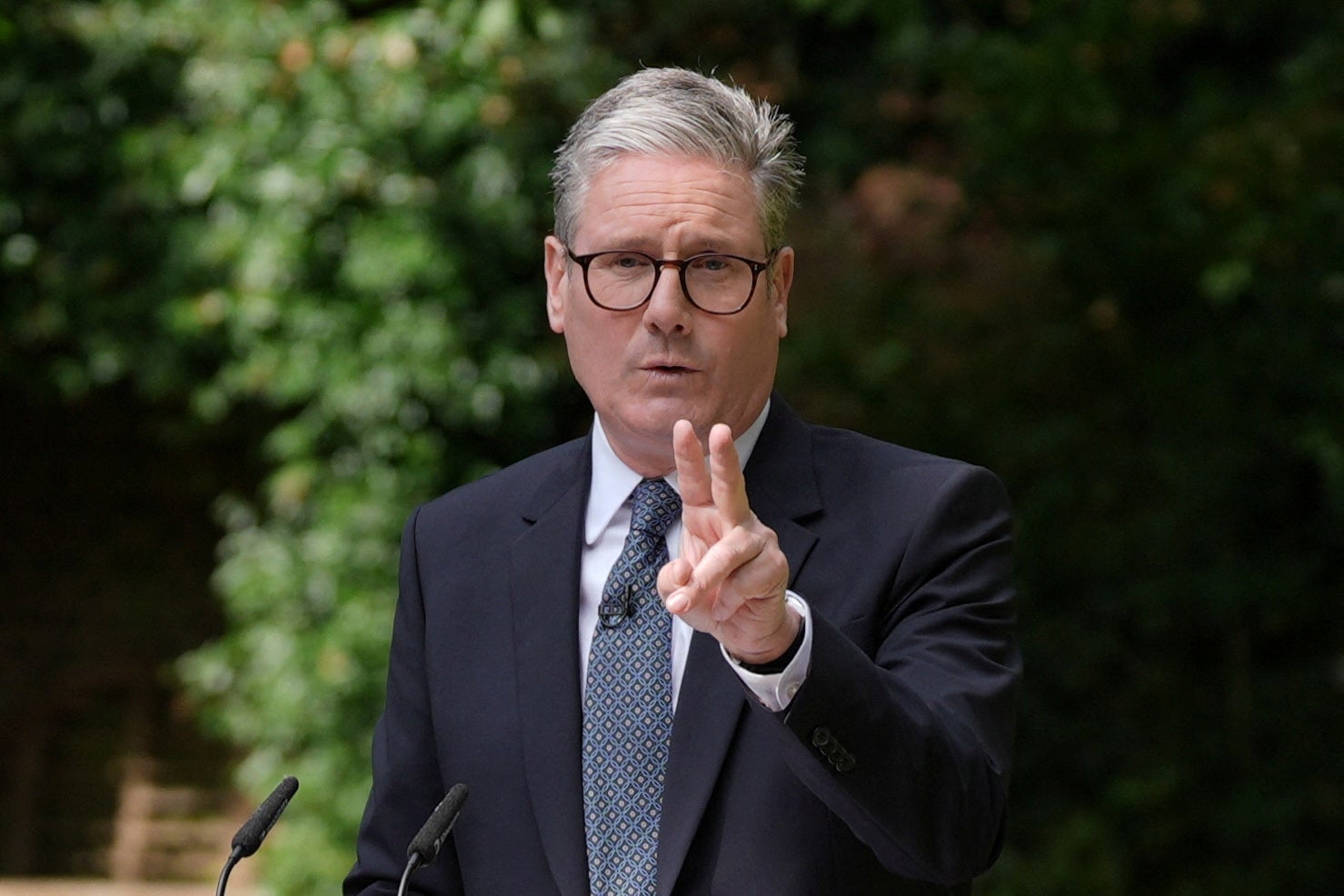Painful times lie ahead for Britain – and for Keir Starmer
Editorial: Gritty, glum, realistic – the prime minister’s keynote speech in the rose garden of No 10 held few surprises (and very little joy)

According to some accounts, the pop group D:Ream would not have allowed the Labour Party to use their catchy song “Things Can Only Get Better” during the recent general election campaign – and, in fact, regret allowing it to be associated with Tony Blair back in 1997.
This may have been just as well for all concerned because, on the basis of his latest keynote speech, Sir Keir Starmer would have to use a cover version instead, retitled “Things Can Only Get Worse (Before They Get Better)”.
In a dark suit, grey tie and beneath an overcast sky, the prime minister’s address in the garden of No 10 could scarcely have been glummer.
A “painful” Budget is soon to come – and for a governing party to use such a term, rather than, say, “difficult” or “tough”, suggests that Britain’s middle and upper classes will be in for swingeing tax rises (being the ones Sir Keir says possess the “broadest shoulders”).
He refused to rule out more cuts to public spending plans, on top of the withdrawal of the winter fuel allowance for most pensioners, scrapping social care reform and cancelling road projects. It seems certain capital gains tax, inheritance tax and higher rate tax relief on pension contributions will make things harder for many households who do not consider themselves especially rich.
With other provisions – and given the outlook on growth – Rachel Reeves’s first Budget will see taxes rise to new and historic highs in relation to the national income. They may not even end there if growth proves more sluggish than hoped. More immediately, if the long list of likely imminent expensive catastrophes comes to pass: the bankruptcy and rescue of Thames Water; the collapse of some local authorities and the failure of the more indebted universities. They have the potential to derail the Labour government almost before it has begun its work.
Of course, all of this could merely be a softening-up exercise and part of a strategy to pin the blame for the parlous state of the public finances on the Conservatives. The allegation is that Labour always planned to raise taxes anyway, partly for ideological reasons and partly to repay their trade union sponsors at the expense of pensioners; but this seems an improbable scenario.
Even under the Conservatives, substantial (and unbudgeted) pay rises for doctors, teachers and rail drivers would have been inevitable. It is absurd to believe that a Labour government would be looking for some convenient excuse to attack pensioners’ incomes or to keep the two-child limit on child benefit. Politicians do not normally court unpopularity, even at this early stage in the life of an administration. Public sector pay cannot be held below market rates any more than private wages: the history of a previous era of failed prices and income policies proves the point that eventually the lid will blow off.
If the aim is, as Sir Keir and Ms Reeves claim, to “fix the foundations” and place the public finances on a sustainable footing, then, while miserable, it cannot be faulted. No nation can hope to attract investment and boost growth unless its public finances are sound and the risk of endemic inflation, higher interest rates and associated volatility is removed, as far as possible. Ms Reeves intends to strengthen the institutional framework around the public finances that will inspire more confidence in the government’s plans, even as she amends the official measure definition of the national debt to exclude the Bank of England’s liabilities (the central bank’s debt itself isn’t going to be magicked away).
Yet, Sir Keir and Ms Reeves also know that, necessary as public finances are to boosting growth, they are far from sufficient. Indeed, Sir Keir acknowledged that “growth, and frankly by that I do mean wealth creation, is the number one priority of this Labour government”. Here, though, the government seems much less clear about what needs to be done, compared with its plans for taxes, spending and borrowing.
It is, to be as frank as Sir Keir wishes to be, overly reliant on relaxing planning rules, the national wealth fund and Great British Energy to achieve that step change in GDP growth that everyone hopes to see. The most important – and most challenging – promise in the whole of Labour’s 2024 manifesto was the pledge “to secure the highest sustained growth in the G7 – with good jobs and productivity growth in every part of the country making everyone, not just a few, better off.”
Sir Keir’s blunt, downbeat, rather negative remarks may not induce the nation to open up the prosecco but it makes for a refreshing change from the mindless cakeism, reckless gambling and wishful thinking of the Johnson, Truss and Sunak administrations. A bit of honesty does no harm – and, given the domestic and world outlooks, an injection of some economic realism is long overdue in the national debate. What is lacking is some sense of confidence in the second part of Sir Keir’s message – that things will indeed improve.
Without a clear and ambitious plan to borrow to invest in the national infrastructure – or a clear determination to undo the continuing malign effects of Brexit – the country cannot yet be confident that Labour’s aspirations will be met. It can rightly castigate the Conservatives for their inheritance but not for everything that happens in the next four or five years.
It certainly can’t claim ignorance if it fails to start to ameliorate the Tories’ biggest blunder of all: Brexit.






Join our commenting forum
Join thought-provoking conversations, follow other Independent readers and see their replies
26Comments